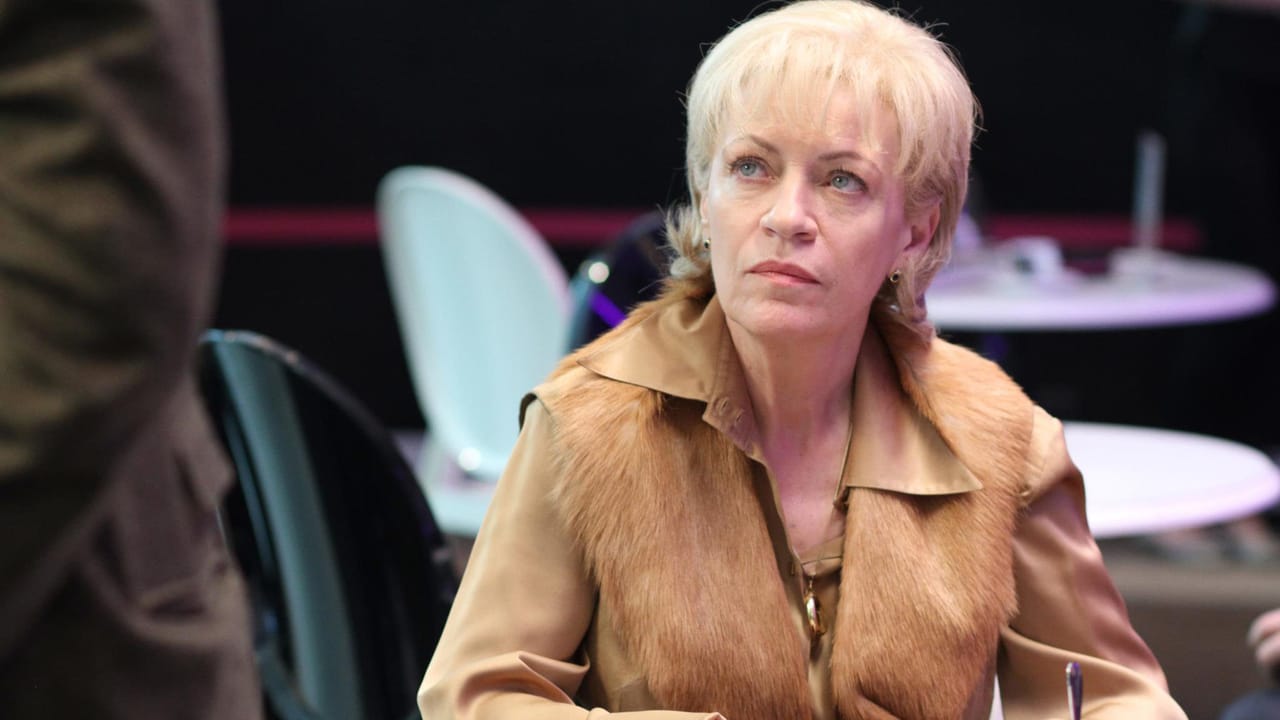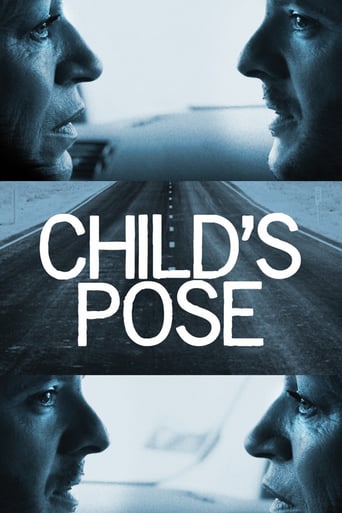

The movie is about action and reaction in life, responsibility and why parents shouldn't try to stifle and spoil their children. More importantly, it is about control and how love understood wrongly as transfer of responsibility and even consciousness leaves the son in the story weak and defenseless, incapable to face maturely the consequences of his actions. on the other hand, He can't do that because he's been taught not to take any responsibility for anything. This does not mean however the mother is the only guilty person. Her love for her son has translated into complete takeover of his individual responsibility. He realizes he must fight her and get back control over his life too late. Love is no excuse for that. The movie is dynamic and to the point. The characters are well defined.
... View MoreFor many non-Romanians this film will be quite difficult to follow because the high speech content means subtitling is only briefly on screen and has to be read very rapidly, all the more difficult when it is on a lower off-screen subtitler as at the Karlovy Vary Film Festival just now. Sometimes I had to choose between reading text or viewing the image. Nevertheless, I found the portrayal of the self-obsessed control freak mother trying to get her somewhat pathetic son off the hook rather laboured. When two characters were conversing the hand held camera swinging from one to the other made me feel like a linesman sitting by the net watching the ball at a Wimbledon tennis match. This was either an intended 'artistic' device or they couldn't afford two cameras. If the former, it failed, and if the latter they should have considered old fashioned cutting and editing. I came to this film predisposed to Romanian cinema having seen the remarkable Somewhere in Palilula last year. I wouldn't describe Child's Pose as a boring European film, as one reviewer put it, but simply as a boring film, with the proviso that I may have missed its finer points due to the language barrier. How it won a Golden Bear at Berlin is one of those intrigues whose story may still be waiting to be told... Anyone care to find out and make a film out of it?
... View MoreWhat would you do if your only son caused an accident in which a 14- year-old-boy died? For Cornelia, a successful Bucharest architect, the answer is clear: she'll fight and she's willing to do everything it takes to keep her son out of prison. At this year's Berlin Film Festival, Child's Pose was the consensus winner of the Golden Bear, the festival's award for the best film. In it, director Calin Peter Netzer portrays an overbearing mother and a member of Romania's upper classes, for whom she and her sense of family come first and then there is nothing for a very long time.At the same time, Child's Pose provides a chilling glimpse into a society in which everything can be managed if you know the right people and have sufficient amounts of money. With its in-your-face documentary-like style dominated by the hand-held camera which is always close but also still and distant enough to allow the viewer long looks into those faces, particularly that of Luminita Gheorghiu's Cornelia. Everything that needs be known is in this face: the hardness, the lack of compassion of a society in which the stronger always wins, the longing for a closeness this world and the laws governing it no longer allow, the scars it leaves.Cornelia is a control freak. In the beginning we see her interrogating her janitor Clara who also cleans her son's apartment. Matter-of-factly but with an almost diabolical determination that borders on the obsessive. When, for minutes on end we see her ploughing through her son's apartment, her loneliness, her isolation and her compensation through the stifling grip she keeps on her son become almost unbearable. This is also true later when she is left alone, motionless and helpless, in her spotless kitchen, a glass of Grand Marnier being her only companion. But then immediately she becomes the efficient, unscrupulous organizer who calmly persuades her son to change his testimony, coerces a witness into co-operating, uses her connections to smooth things regardless of the victims. When, at the very end, tears roll as she tries to convince the boy's family to drop charges, the question how much of this is real and if it is, who is she crying for, has become unsolvable.But Cornelia is no monster: the scariest part of the film is how perfectly she fits into this world, how acceptable all that she does is: to her husband, her friends, even the police. If her son rebels, it is against her overbearing nature, not her questionable tactics. This son, too, is a scarred individual, a selfish loner who needs to be if not at the center of attention than at least at the center of his world. Bogdan Dumitrache plays this Barbu as a childish, weak, hostile, cowardly man who is way too similar to his mother for his own good, product and symbol of a society in which money can buy you anything. Child's Pose shows how a corrupt world that has lost its balance and its center deform those who live in it, particularly, those who think they rule it, those who built t in the first place. But there is hope: in the quiet dignity of the boy's parents and maybe even in that quietly improvised gesture Barbu musters up in the end and which we watch from a distance, from inside a car. A small hint of an ultimate emancipation, a tiny act of growing up, almost imperceptible, but even more earth- shattering for it.Child's Pose is a relentlessly honest film that keeps us watching when we want to turn our eyes away, that provides an unfiltered, direct, in- your-face perspective on a world so shiny on the surface and so hollow beneath. And it is a chilling portrait of people struggling and failing to avoid loneliness, longing for each other, but drifting apart the more they're clinging to the other. Calin Peter Netzer's naturalistic style is far from heavy, it never imposes itself on the film, it forces us to keep looking, to stay close to this woman fighting like a lioness for her child while overstepping all lines of what we might call morality, asking us what we would do, where our limits are and how much we'd weigh morals when all we care about is at stake. This Cornelia is so far and so near at the same time. A chilling, moving film not at all easy to forget.http://stagescreen.wordpress.com/
... View MoreIf I'd have to put my money on which film will win the Berlinale this year, I'd say this one, and not because I was born in Romania and share the ethnic group of director Călin Peter Netzer (even though I cannot say for sure that this fact does not influence my judgment).The story: Cornelia, a middle-aged high society architect, is informed by her sister-in-law that her son Barbu has killed a child in a traffic accident, and both immediately proceed to the police station where he is being held for questioning. They barge into the interrogation, all the while phoning useful contacts, and manage to change Barbu's statement, after which they take him back to his parent's house. In the following days, Cornelia develops various schemes to get Barbu off the hook of a trial, receiving unexpected support from Barbu's wife (or girl-friend) Carmen, even though they thoroughly hate each other.The accident itself is not the main story. It serves as a backdrop for highlighting the blatant disregard of the rich for the poor, the pervasiveness of corruption in Romanian society, and to illustrate how possessive and self-serving Cornelia is. Most screen time is devoted to Barbu's 'cutting of the post-natal umbilical cord', his sometimes desperate, mostly half-hearted attempts to gain independence from his overprotective mother.The strength of the film lies in the ambiguity of its characters, foremost Luminiţa Gheorghiu's Cornelia, which she brilliantly portrays as a vicious self-obsessed diva totally immune to the plight of others, and who is still thoroughly devoted to her son. The viewer is torn between disgust and pity for her, for instance, when stopping in front of the killed child's parents, she exclaims 'Damn, it's one of the better houses', indicating that her only interest is to buy the parents' consent to revoke their claim against Barbu. Yet when sitting with them at a table, she so tearfully describes her plight that one cannot help but feel moved. Barbu, on the other hand, is a hypochondriac and coward, who for most of the time cannot admit to what he has done, but when he argues with Cornelia to back off, one cannot help but wonder how he could have turned out any other way, given the obsessive nature of his mother.The real icing on the cake, however, is a brief scene between Cornelia and the principal witness to the accident, whom she hopes to bribe. Vlad Ivanov (of 'Doctor Bebe' fame in '4 months 3 weeks 2 days') once again plays a cynical ruthless character who confronts the female protagonist with the fact that the situation forces her to do precisely what he wants - well, maybe not quite. This scene is the best of any Romanian film I have seen in the past five years and merits the price of the ticket alone.What may elude a non-Romanian viewer of this film is that the title itself is also ambiguous, 'poziţia copilului' being a wordplay with 'poziţia corpului', which means 'position of the body', a term used in police reports to describe the location of an accident victim when found. This recalls 'poliţist, adjectiv' by Corneliu Porumboiu, which in 2009 won the Un Certain Regard Jury Prize in Cannes. That title is also a wordplay, and Netzer shares many stylistic resemblances with Porumboiu.If the film isn't perfect, then because of Netzer's tendency for emotional overkill; he rides his protagonist's credibility a little too hard sometimes, as in his debut feature 'Maria' (2003). However, that film is still alive in my memory precisely because the misery of the main character was so all-encompassing, so he may be using exaggeration as an artistic tool. 'Child's Pose' is a little too obviously geared towards festival expectations rather than domestic audiences - Romanians tend to prefer their social criticism with a large dosage of humor, as in all-time favorite 'Filantropica' (2002) by Nae Caranfil. But since the acting is mostly nothing short of brilliant, these calculations do not harm the film's artistic value and social message.
... View More